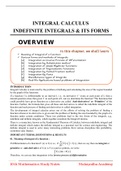Class notes
Indefinite Integration Skills & Techniques
- Course
- Institution
Here is a list of topics that are covered in this chapter. Integration by Parts – In this section we will be looking at Integration by Parts. Of all the techniques we’ll be looking at in this class this is the technique that students are most likely to run into down the road in other classes...
[Show more]



